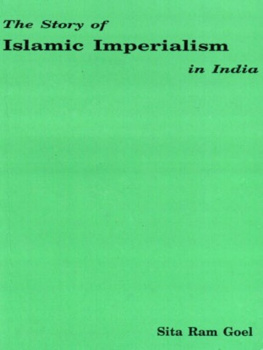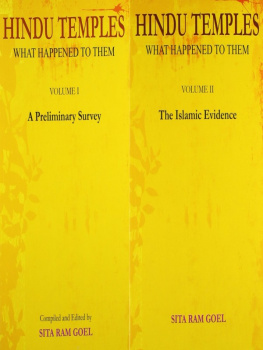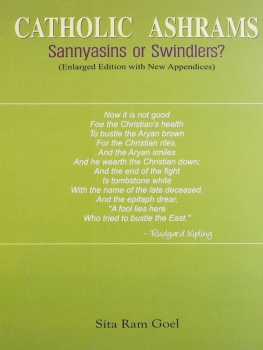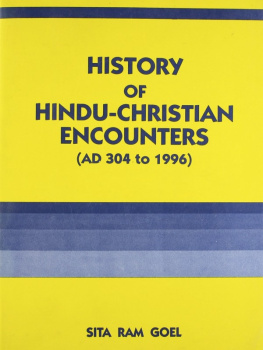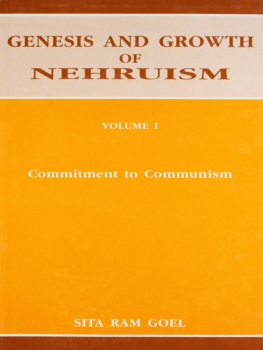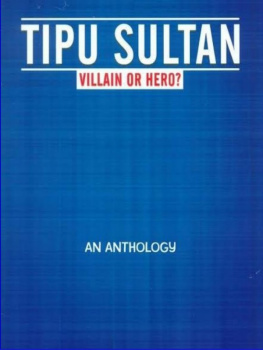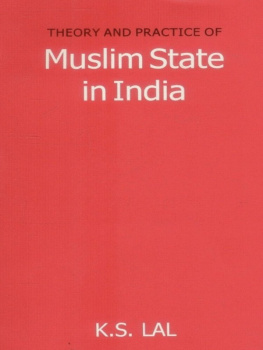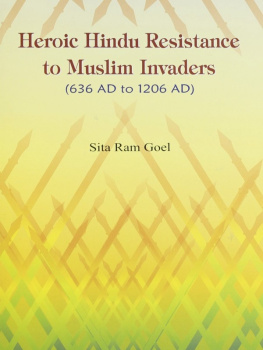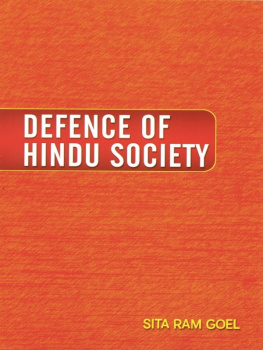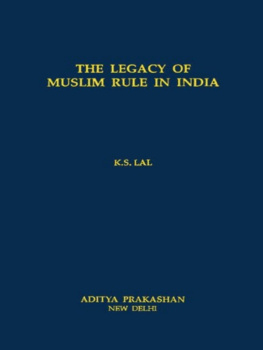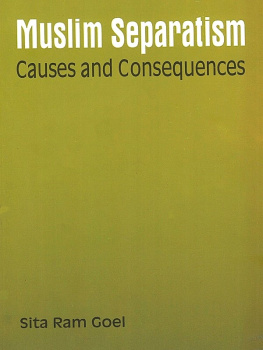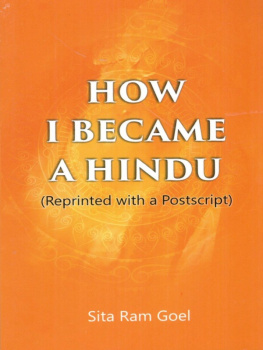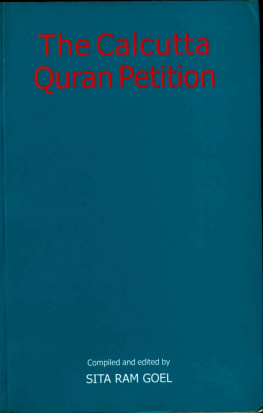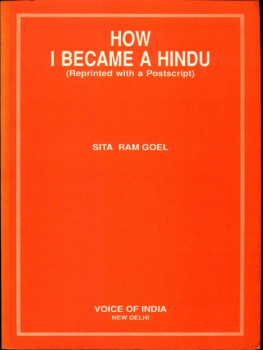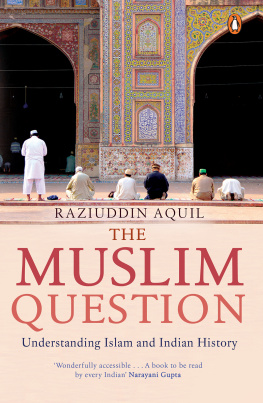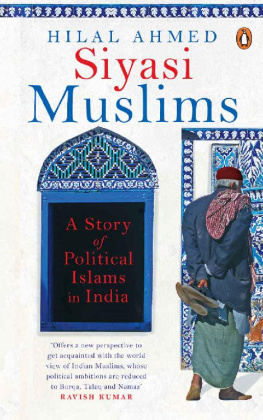THE STORY OF ISLAMIC IMPERIALISM IN INDIA
SITA RAM GOEL
Voice of India, New Delhi
THE STORY OF ISLAMIC IMPERIALISM IN INDIA

SITA RAM GOEL
Voice of India, New Delhi
Table of Contents
CHAPTER I: IN THE NAME OF NATIONAL INTEGRATION
Comrade Radek, whom Stalin liquidated in the late 'thirties, was a Communist intellectual endowed with acid humour. He coined many jokes at the cost of the Communist Party and the Soviet State. One of these jokes which did the rounds in Moscow was as follows:
One day Comrade Radek stood stark naked in the Red Square in broad daylight. A courageous citizen approached and asked him, 'Aren't you afraid of the police, Comrade Commissar?'
Radek stared at him, and shot back, 'Police? Where is the police?'
The citizen pointed towards a number of policemen positioned on all sides of the Square, and said, 'There is a policeman. There is another. And yet another' Why, the whole place is crawling with policemen.'
Radek replied, 'You can see them. I can't. I am a party member. I am not supposed to see them. For party members there is no police anywhere in the Soviet Union.'
The ruling class of secularists and socialists in India today is in a similar situation of ideological blindness. It is not supposed to see the violent waves of Islamic imperialism surging all around it. That would be a sacrilege and a serious slur on its reputation as progressive, liberal, and large-hearted.
It is in the living memory of this ruling class that Islamic imperialism became a blood-thirsty monster, and carved out large limbs of the motherland on our East and West. It is in the living memory of this ruling class that Islamic imperialism 'cleaned up' its separate state of Pakistan from the 'curse' of Hindu infidels. And it is under the very nose of this ruling class that Islamic imperialism, aided and abetted by petro-dollars, has started claiming for itself the rest of India as well, by a right of conquest in the past.
Islamic imperialism has only to dispute the fact that India is a Hindu homeland, and that the age-old Hindu society constitutes the core of the Indian nation with which non-Hindu communities should get integrated.
Our ruling class of secularists and socialists immediately starts seeing Hindu society as a heterogeneous mass divided by race, religion, sect, caste, class, language, dress, food habits, local traditions, manners and mores, and what not, and united by nothing better than a shared slavery under the erstwhile British rulers!
It is of no avail to tell this ruling class that the British rulers were acutely aware of a deeper unity informing the vast and variegated fabric of Hindu society. It is not convinced by any amount of evidence that the British rulers did all in their power to undermine that unity in pursuance of their imperialist interests.
This ruling class has inherited many things from its British mentors. It has inherited the British state system in which the 'natives' who do not know the English language and the modern Western lore, have no say. It has inherited the British style of high-living which sets it apart from the 'seething mass of poor and illiterate humanity'. It has inherited the British psychology of paternalism which persuades it that it alone knows what is good for the 'common man'. Above all, it has inherited the British 'moral responsibility' for protecting the 'Muslim minority'. The only thing it has managed not to inherit is the British awareness of a deeper unity which holds the Hindu society together.
It is, therefore, logical for this ruling class to assert, rather aggressively, that Hindus have never been a nation. It is also logical for this ruling class to proclaim that it is too late in the day for Hindus to become, even try to become, a nation. India, we are told, is now a land of many races, religions, and cultures. The best that can be done under the circumstances, they say, is that India evolves a 'secular nationalism' based on a 'composite culture'. The ruling class is prepared to preside over the birth-pangs of such a nationalism. The exercise is eulogised as 'national integration'.
It is significant that harangues for 'national integration' become hectic, almost hysterical, in the wake of every street riot staged by Muslims. Our ruling class immediately starts hurling long-winded sermons on Hindus - stop being communal killers of a helpless minority; get rid of this big-brother behaviour; protect the lives and properties of your younger brethren; respect the religious and cultural rights of Muslims; and so on.
This ruling class never waits for the findings of enquiry commissions it has itself appointed to look into the causes of earlier communal riots. It does not remember or manages to forget the findings of many enquiry commissions which held that almost all riots were started by Muslims.
Hindus are expected to listen to these lectures from the ruling class with bowed heads, and with an orgy of moral self-reproach. Woe betide the irreverent Hindu who questions the legitimacy of these lectures, or who cites the evidence of enquiry commissions. He is not only a 'Hindu communalist' and a 'Hindu chauvinist' but also a 'reactionary' and a 'revivalist', putting the future of 'secular and democratic India' in jeopardy. The ruling class is joined in this chorus by some pious people like the Gandhians according to whom such an unrepentant Hindu is not a Hindu at all. There is a lot of tongue-clicking all around.
In plain and simple language, therefore, national integration has come to mean only one thing, namely, that a meek Hindu society should get integrated with a militant Muslim millat. One waits in vain for a voice which so much as whispers a why in the face of boisterous Muslim bigotry. Muslims have a god-given right to go on raising accusing fingers at the Hindus for refusing to give them this or that. And the Hindus have a god-given duty to go on conceding every exclusive and imperialist claim of an incurable fanaticism.
The results of this 'national integration' patronised by our ruling class over the past many years are there for every one to see, except, of course, its authors who are under an ideological compulsion not to see them. Caste which was for ages the most cohesive factor and a sure source of strength for Hindu society, has been converted into a cancer which poisons the very springs of our politics. Regionalism fostered by local patriotism, missionary machinations, and sectarian separatism has assumed alarming proportions such as imperil the very unity of the motherland. And Islamic imperialism has become many times more self-confident and self-righteous than on the eve of Partition.
THE CHARACTER OF HINDU UNITY
The only stumbling block which has so far stood in the way of this 'national integration' promoted by our ruling class is the spirit of unity that still survives in Hindu society.
It is quite some time that Hindus lost the consciousness of their spiritual centre which unites their society, culture, and way of life. The only source of Hindu unity now is a consciousness of common history, particularly the history of freedom struggles fought against Islamic and British imperialism.
Hindu society still takes pride in its great past when it made major contributions to the spiritual, cultural, philosophical, and scientific wealth of mankind. Hindu society still cherishes the memory of its great sages, seers, saints, scientists, scholars, soldiers, and statesmen. Hindu society still remembers the days of its distress when it had to struggle ceaselessly and very hard against horde after horde of Islamic invaders who not only slaughtered, burnt, pillaged, and enslaved but also tried too foist by force its own brand of barbarism.

